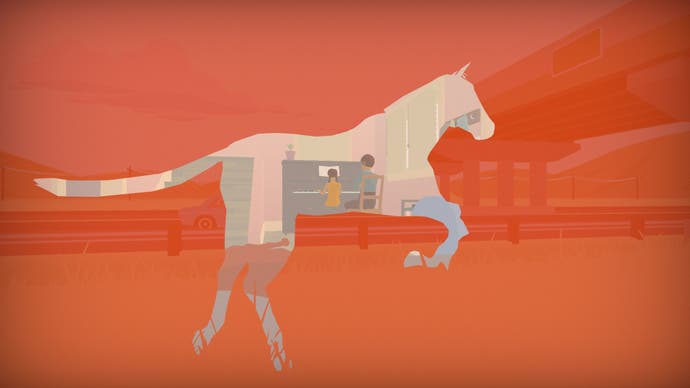Hindsight review - a glorious, elbowy, frustrating examination of memory
Objective: correlative.
It is impossible to get your head around memory. It's intangible, yet all-powerful. It can be like living with a ghost, but the ghost is Arnold Schwarzenegger.
If I was making a game about my own memories, my own experience of interacting with memory, I am confident that it would be the worst game ever made. An open-world affair, but an endlessly glitchy one. Landmarks disappear and shift. The same journey can take hours one day and seconds the next, and when you reach the destination it's entirely different anyway. And wherever you go, you're always at the centre of the map. I do not want to play this game.
But what about a game exploring someone else's memories? What form would that take? What problems might it run into? Hindsight is an attempt to answer the first question, I think, and it also provides plenty of answers to the second.
Hindsight is the story of a woman returning to the family home once her mother has died. She packs her mother's things, moving room to room, and then she leaves. That's one story. The other, deeper story is of the brisk thermals of memory she rides as she moves through the house: the distant past hypertexts itself into view, simple paths are suddenly blocked, time curves, then loops, then spirals.
It's pure montage - a series of dioramas delivered in flat colour and with simple 3D models, the whole thing carefully blanched of texture and too much in the way of specificity. The form this montage takes, though, is more complex. I would say that Hindsight deals in turns, ghosts and windows.
Turns: you move the camera around a fixed point in most dioramas, viewing the scene and looking for things to click on that might move the scene forward. Some are ghosts: the protagonist is clearing one book shelf, but a ghost by the table suggests her next destination, and her next task. Others are objects - bags, tyre swings, an awful lot of knives. Click on the object, or move around it enough, and it becomes a window onto the next scene. Click through the window and the story continues, but you're somewhere else.
What Hindsight is getting at, I think, is the way that memory makes these odd little hops. If you've ever stopped mid-sentence and wondered how you got to talking about Reece's Pieces, when you started out wondering about the weather, the process of working your way back reveals those hops in all their quirky, individualistic logic. This then that then this. Our conversations are made of stepping stones.
So yes, Hindsight nails that. In one scene a kettle reveals an ancient memory of the family in the kitchen. It reminds me - oh god, memory is never simple - of the way that the smell of a gas hob and hot marmalade always takes me back to my English grandmother's kitchen too. All I have to see is a toast rack and I'm lost for ten minutes in melancholic reverie. So lucky, really, that toast racks are out of favour these days.
But Hindsight runs into trouble quite regularly. For one thing, you move the camera with one stick, and a nasty, sluggish cursor with another. Why both? With both you're basically doing the same thing - hunting for clickable objects - but now you have to do it twice, moving the camera and then zeroing in with the cursor.
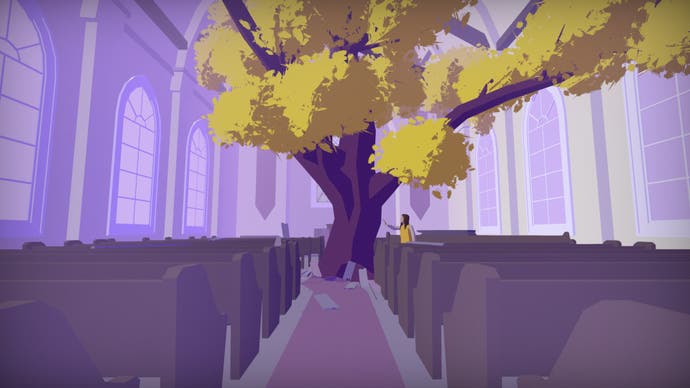
Some of these clickable objects are very small - hence the cursor, perhaps. But hunting around for what amounts to scene transition triggers is not the game at its best anyway. We're not in the realm of skill games here, and more importantly, the game seems to want to flow - from turn, to ghost, to window - the way that memory flows, carrying you along from one self-disguising twist to the next. Hunting around for triggers kills the flow and makes the game feel choppy.
Sorry, another problem. There are lovely interactions here - you'll move books in a bookcase to reveal a scene hidden behind them, you'll group raindrops to make a mirror, and move clouds from the sun, but as you work, navigating the edgelands between memory and the reality, you're not alone. Hindsight has a protagonist who is also a narrator, so as you shift through these beautiful, poised slices of time and thought, you get the subtext translated to text and slapped on top of everything.
The narration is fine, but it feels like a team lacking the confidence that they can tell a story in images, where the story belongs. Often it's an annoyance - the music seems intent on underlining things a bit too much as well - but occasionally it can really hurt things. Rather than making things feel more personal, it somehow renders sequences generic. Rather than pulling us in, it actually distances us, by pushing us out to the hinterlands of platitude.
It also diminishes the player's role. The most interesting work in this game is all writability - the navigating of emotional scenes, the shuffling and selection of possible interpretations. What are these people feeling? What might they do next? How might they be misunderstanding each other? When the voiceover pops in to answer these questions - "I was desperate for praise!" - it simultaneously irradiates any of the intriguing ambiguities. And it feels like a lie: how often are we only feeling one thing, with no internal contradictions?
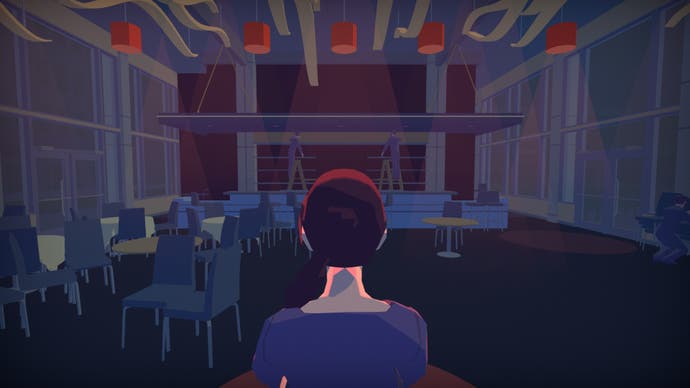
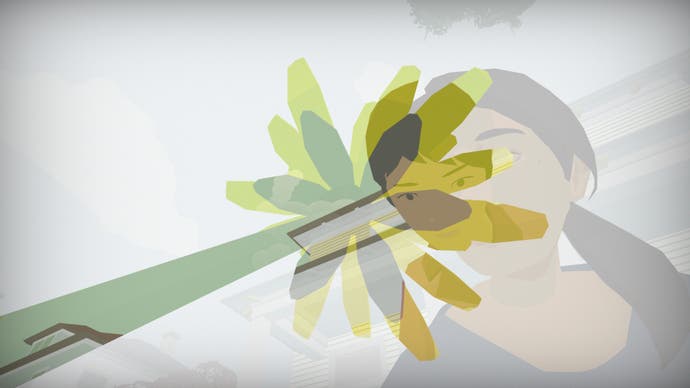
At its worst the narration means your role becomes purely technical, purely physical - you're moving the camera, selecting parts of an image, packing the mother's house and getting the boxes into the van. And at this point I started to play the game rather than engage with the narrative - I was more likely to hunt around for the object that is glowing, rather than look around the house for the specific item that the story logic calls up next. During the most fraught moments, I came to hate the narration for the way it robs the story of its power.
Not always though. At times, Hindsight remembers the impact of silence, particularly in a sequence towards the end where imagination literally spills into memory and threatens to sweep everything away. The game blooms. I was left to pick through images, pondering the way fantasy and memory work together, and often undermine one another.
The more I played, the more I managed to dial into the things that Hindsight does really well. Which is to say that over time I came to focus on what the game's saying rather than the sometimes self-involved, self-defeating way it tries to say these things. Or maybe, to flip it in a way that feels honest, I stopped trying to be clever about the things I felt the game was doing incorrectly. My own narrator took a welcome break.
"At times, Hindsight, this fascinating, awkward game, truly soars"
And what emerged was a simple, powerful story of a child raised by a mother who is fascinating, unreadable, and often quietly punishing. The daughter and the mother clash. The daughter wants things, the mother wants other things. The daughter wants to take risks and the mother is cautious and - worse - lecturing when things go wrong.
It goes both ways, of course: the mother wants to give the daughter a sense of her own heritage, of her life back in Japan before she moved to America, and the daughter comes to feel guilty for finding this a chore. (The game is at its most precise and penetrating when it's examing this theme. The experience of being raised by a parent from another culture ripples through Hindsight in dozens of ways that I could appreciate and learn from, and most likely dozens of other ways I could not see. It's a generous and enlightening game in this regard.) Mother and daughter at odds on many fronts. Maybe this is the point the narrator is really making - all this monologue and no dialogue.
It can be very effective. In the present day, back at the daughter's sterile apartment, we get a clear sense that something has gone wrong for her along the way: the sheer grey walls and empty space seem to speak of it. It's a prompt to your own memories, your own fears. Inevitably it makes me think not just about the people in the story but the everyday challenges of parenting on this side of the screen - how to show interest without it leadening into pressure, how to listen to other people's passions rather than just sharing your own. Playing this game, to me at least, has been a reminder that every parent is also someone's child - an extremely obvious point, I know, but just look at it written down. No wonder we're often such pretzels of emotion and doubt.
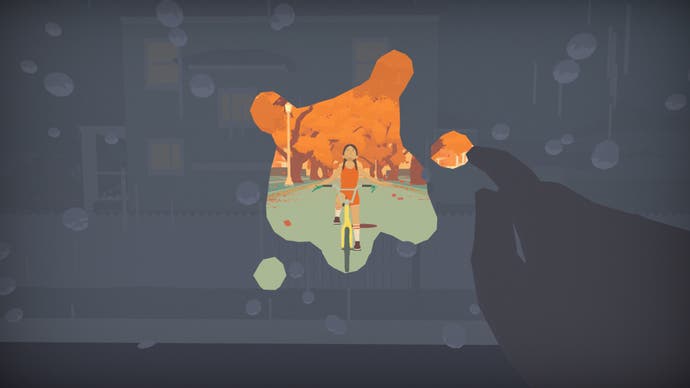
At times, Hindsight, this fascinating, awkward game, truly soars. The daughter is at a piano lesson - her mother wants her to play - but her mind is elsewhere. I open the nearby window shutters and we're in a car, cruising though the countryside. The parents are in the front and the daughter is in the back, captivated by a galloping horse that nobody else is paying attention to. Here is passion, and it's private, neglected passion. No game could toy with this kind of material without emerging with something memorable to say.
"We look at the world once, in childhood; the rest is memory," says the poet. I admire that quote's ability to zero in on our limitations, even as I question its airlessness and certainty. What I do think, though - and I think Hindsight gets at this in its own gorgeously elbowy manner - is that childhood is the puzzle we spend the rest of our lives trying to solve.
